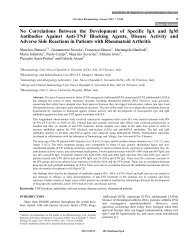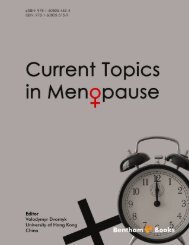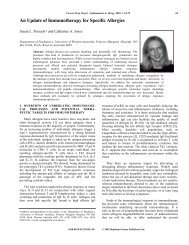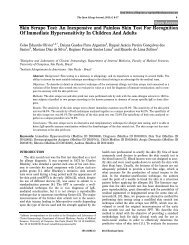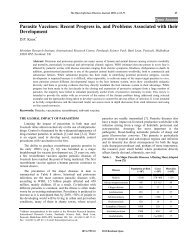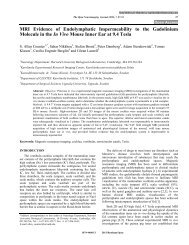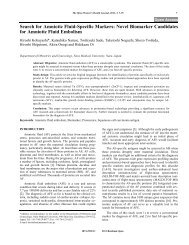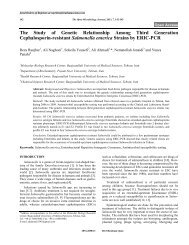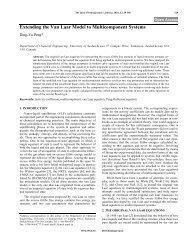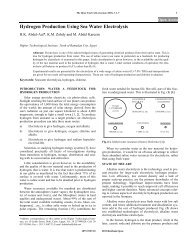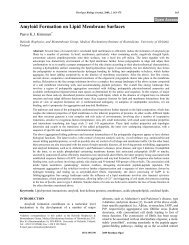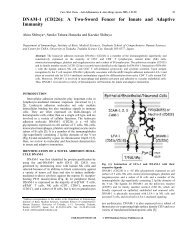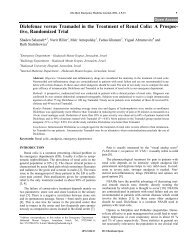chapter 3 - Bentham Science
chapter 3 - Bentham Science
chapter 3 - Bentham Science
You also want an ePaper? Increase the reach of your titles
YUMPU automatically turns print PDFs into web optimized ePapers that Google loves.
242 Applications of Spreadsheets in Education The Amazing Power of a Simple Tool Kyng et al.<br />
between industry and the curriculum that delivers graduates to industry. Earlier studies [3, 4] found<br />
that graduates in the finance industry wanted more learning of software tools at university. In this<br />
study we focus on the in-depth use of software in the finance industry to enable universities to<br />
ascertain the potential benefits of including such software in the curriculum. We investigate the use<br />
of software by recently hired graduates working in the areas of banking, finance, insurance, and<br />
financial risk management.<br />
11.2 Background<br />
The use of software in university education can serve two purposes: it can enhance learning of<br />
concepts; and it can familiarize students with specific software that they will later use in their<br />
working lives.<br />
Recent research points to the effectiveness of software in achieving the first of these aims – enhancing<br />
student learning. Wagner [5] observed significant improvements in problem-solving across<br />
several numeric tasks among engineering students exposed to Excel and related programs. Johnson<br />
[6] claims that use of spreadsheets facilitates hypothesis testing, the investigation of variants<br />
and algebraic reasoning. A significant amount of literature suggests that spreadsheets allow users<br />
the opportunity to increase the scope of their respective roles. Holton [7] suggests that such applications<br />
allow users to recognize patterns “if they are not tied down with interminable calculation<br />
that they may or may not do correctly.” Although he particularly discusses integrating spreadsheet<br />
applications into tertiary mathematics education, there is certainly scope to transfer the concept to<br />
the financial sector and the role of financial graduates. Similarly, Lavicza [8] points out that “computers<br />
were originally invented to enhance and accelerate tedious mathematical operations” and<br />
Forster [9] adds that “passing mathematics processing to a technology allows students to focus on<br />
mathematics properties and relationships, provided that technical expertise is in place.” Togo and<br />
McNamee [10] concur, pointing out that spreadsheets allow users the opportunity to master “the<br />
problem process rather than obtaining a solution to a specific problem.” Marriott [11] also emphasizes<br />
that the “integrative use of spreadsheets as a computational tool serves to focus on higher-level<br />
learning skills.”<br />
The second purpose of the use of software in university education – to provide students with<br />
specific software that they may later use at work – has not been comprehensively studied across<br />
all areas of the financial sector. The majority of studies are of accounting graduates with very few<br />
studies of graduates in finance: the literature is reviewed in the following sections. While there is<br />
some overlap in the use of technical software, industry specific studies, such as the one reported<br />
in this <strong>chapter</strong>, are of more assistance in designing curricula for graduates moving into specialized<br />
industries.<br />
Spreadsheets are the most common application used by recent graduates in the financial sector.<br />
This has been true for a number of decades, even while we have seen accounting information<br />
systems “undergo extensive change in the past 35 years” [12]. Waller and Gallun’s study of 36<br />
accounting organizations in 1985, including the ‘big eight’, discovered a “predominance of spreadsheet<br />
applications” being used in the financial sector (cited in [13]). Almost 15 years later, just<br />
before the turn of the millennium, “spreadsheets remain at the forefront of accountancy work practices<br />
and are used on a daily basis by most accountants” [14]. Recently, Kyng and Taylor [4] report



